Autumn in New York
Some highlights:
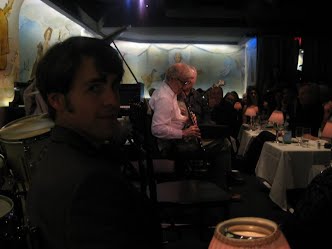
Hanging out with Woody Allen at the Carlyle on the Upper East Side, like old friends. It's not super publicized, but Woody plays jazz clarinet there on some weeknights during dinner, and we were able to score a primo spot!
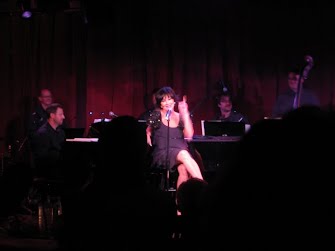
We also scored choice seats to see the last night of Chita Rivera's three night cabaret run at Birdland. She was phenomenal-- such a pro.
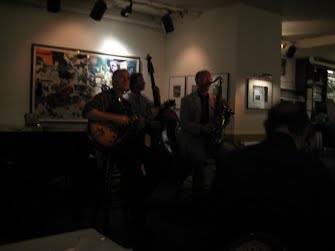
Not all of the music we saw was performed by senior citizens! We also had brunch at Cafe Loup in the West Village, where we saw my cousin Ray Parker play bass (he's the one in the middle.) Delicious food, jamming music and a familiar face-- a great way to make a big city feel cozy on a rainy Sunday.
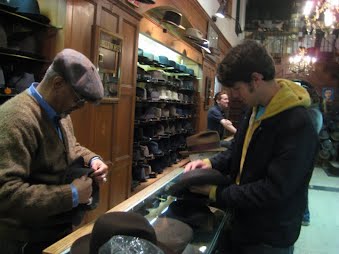
We shopped for hats at the JJ Hat Center, the city's oldest and largest haberdashery. The salesmen there are so sharp, and really know their stuff. Move over, Bogie!
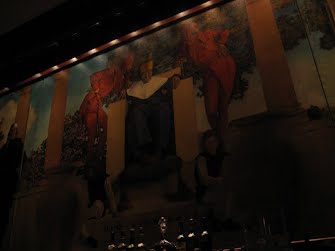
Of course we had some great cocktails-- we hit up one of my favorite old haunts, the Old King Cole bar at the St. Regis (newly restored mural above.)
Brett also said one of my favorite things of all time during this trip, when, at a bar, I informed him that I overheard the couple next to us complaining about their Grey Goose cocktails. "I'm sorry," he said, "But I have no sympathy for the plight of the vodka drinker."
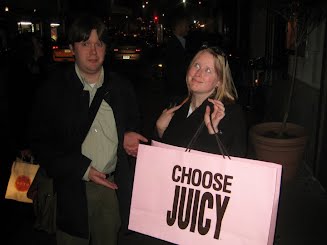
We met Dan and Katie for dinner at Otto, Mario Batali's pizza place in the West Village. I know, I know, this image is kind of dominated by the big shopping bag-- Katie had just bought a birthday pressy for a good friend at Juicy Couture. Lucky lady!

Bagels, bien sûr.
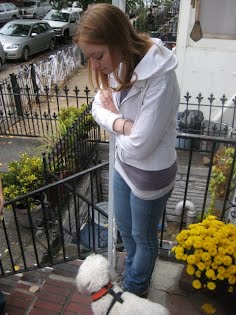
We wrapped up the trip with some quality time with family in Brooklyn. A perk of staying with family for a couple of days is being able to play with their cute dogs.
Homecoming
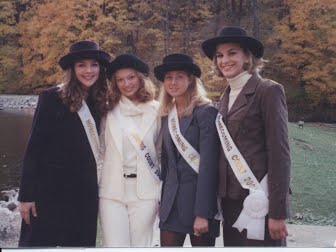
With my friends Desiree, Erin and Dayna; October 2001
October always makes me think of changing leaves, bonfires, and football games-- and gives me a fresh perspective on my current surroundings and what lies ahead.
The feeling I associate with this time of year is pretty uniquely rooted to where I grew up. The image above is from the beginning of my senior year of high school-- exactly 8 years ago this month. Enough time has passed now that this picture makes me smile, rather than blush.
In my hometown in Western Pennsylvania, where football is king, Homecoming was always a huge deal. On Friday afternoon, the eight girls on Homecoming court donned gowns and rode on the back of convertibles as part of a big parade throughout town. Then, we all changed into hats and suits (I'm not sure where exactly that dress code came from) and went out together to a group dinner with one of our dates (each girl chose a football player and a 'civilian' to escort her to the various festivities.) We ended the night by cheering on the team at the football game. And, of course, there were tons of fun things that everyone did in the "Spirit Week" leading up to Friday's game and the dance on Saturday night.
I know the whole thing can sound really cheesy and old fashioned, and of course I have fantastic memories from the autumns I've spent in New York City and San Francisco, but participating in those traditions was so exciting in a very singular way. I've only recently realized that not everyone gets to feel such a strong sense of being a part of a larger community when they're growing up-- or ever.
We might not get many changing leaves in coastal California, but come October I can still smell a crispness in the air that spurs a shift in my outlook. And to this day, the optimistic feeling I get in the fall comes just in time.
Fitzgerald on the Fall
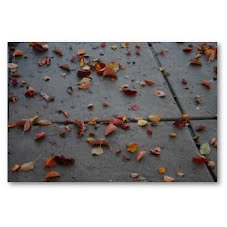
'What'll we do with ourselves this afternoon?' cried Daisy, 'and the day after that, and the next thirty years?'
'Don't be morbid,' Jordan said. 'Life starts all over again when it gets crisp in the fall.'
--From F. Scott's The Great Gatsby, of course
On WASPiness
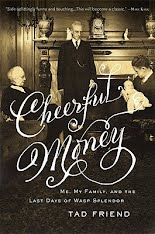
Another great find from this week's NYTimes Book Review is New Yorker writer Tad Friend's memoir, "Cheerful Money: Me, My Family, and the Last Days of Wasp Splendor.
The Times pithily describes Friend's book as recounting "with amiable nostalgia, the foibles and predilections of a declining caste." Although I'm not exactly from the Nantucket-summer-home set, I can certainly relate in a general way to some of the idiosyncrasies he describes.
A couple good excerpts:
“If Catholic guilt is ‘I’ve been bad’ and Jewish guilt is ‘You’ve been bad,’ then WASP guilt is ‘You probably think I’ve been bad.’ ”
“Visible striving or seriousness of purpose is unWASP because it suggests that you aren't yet at-- haven't always been at-- the top."